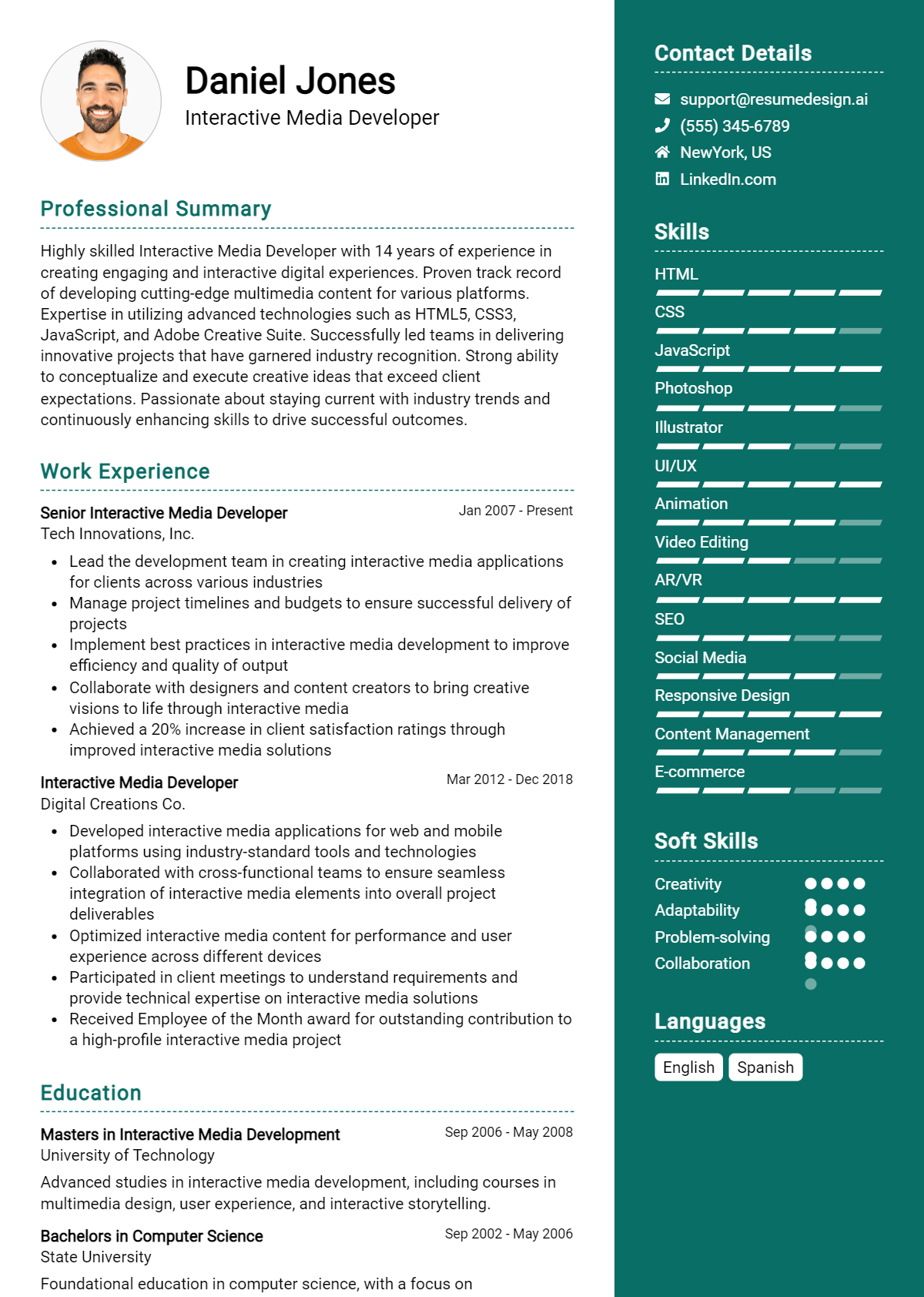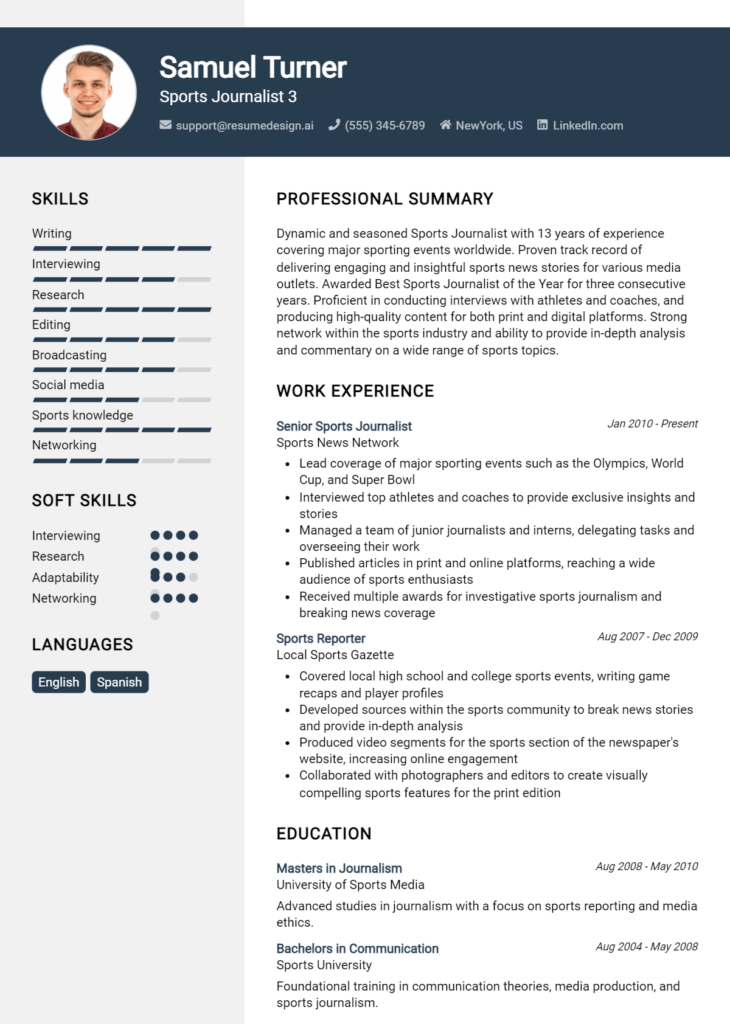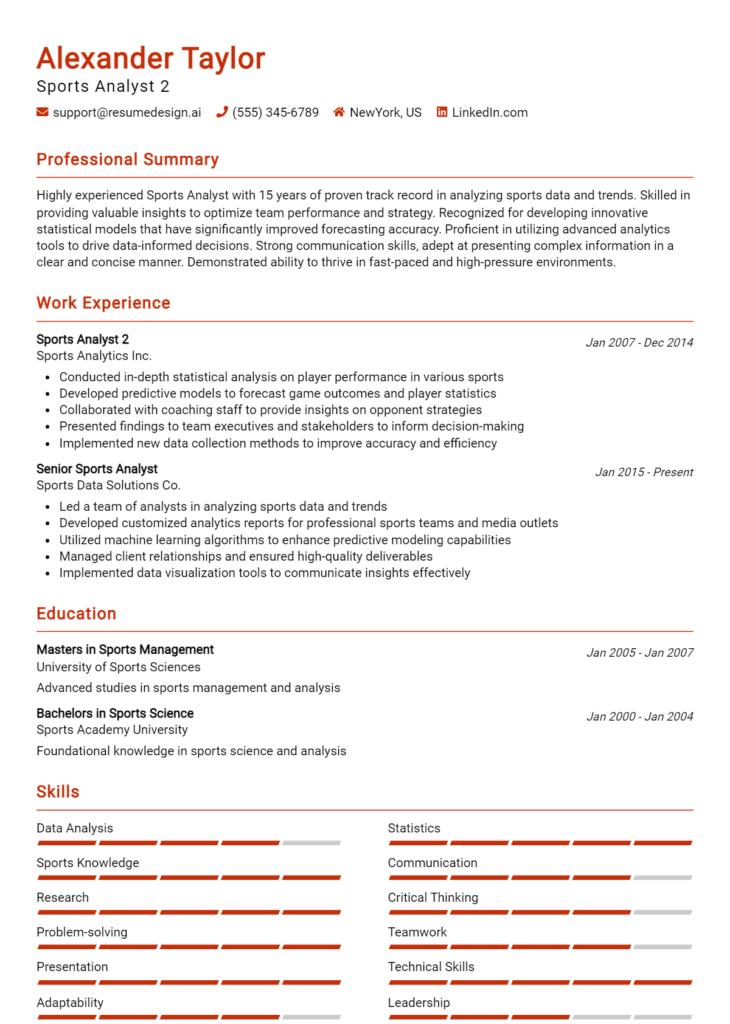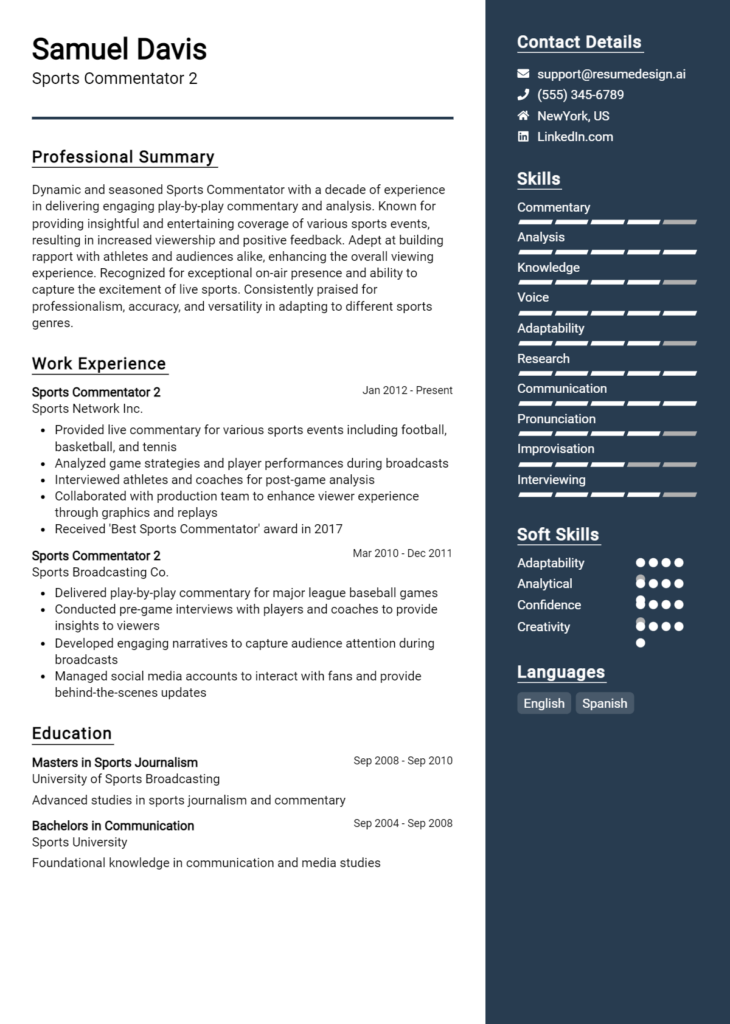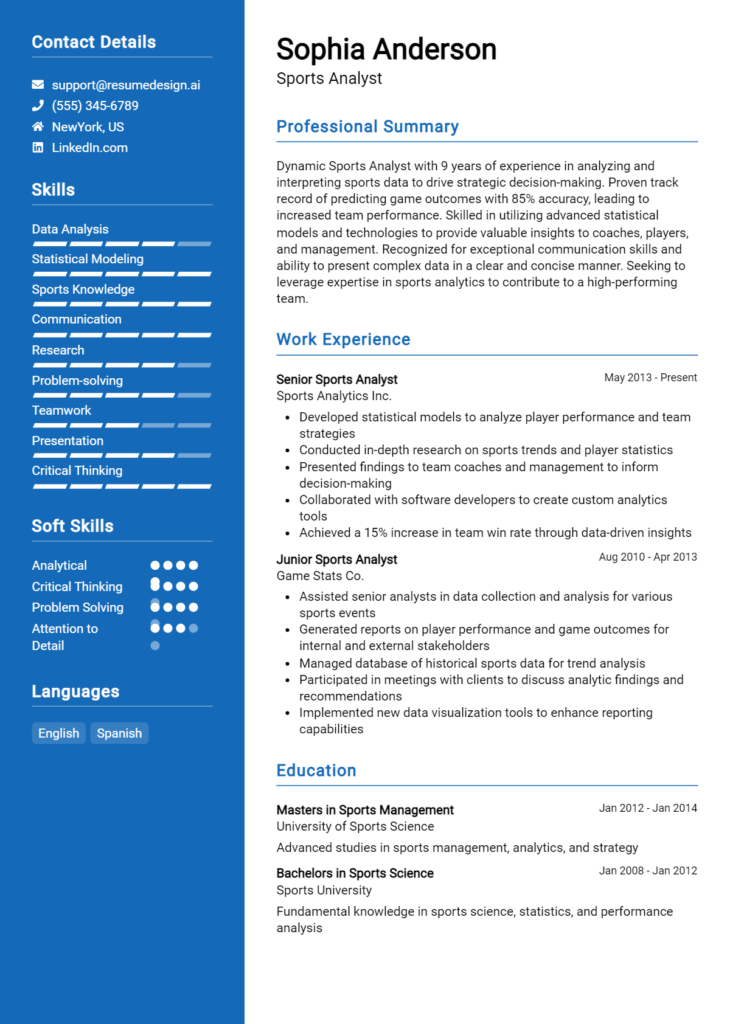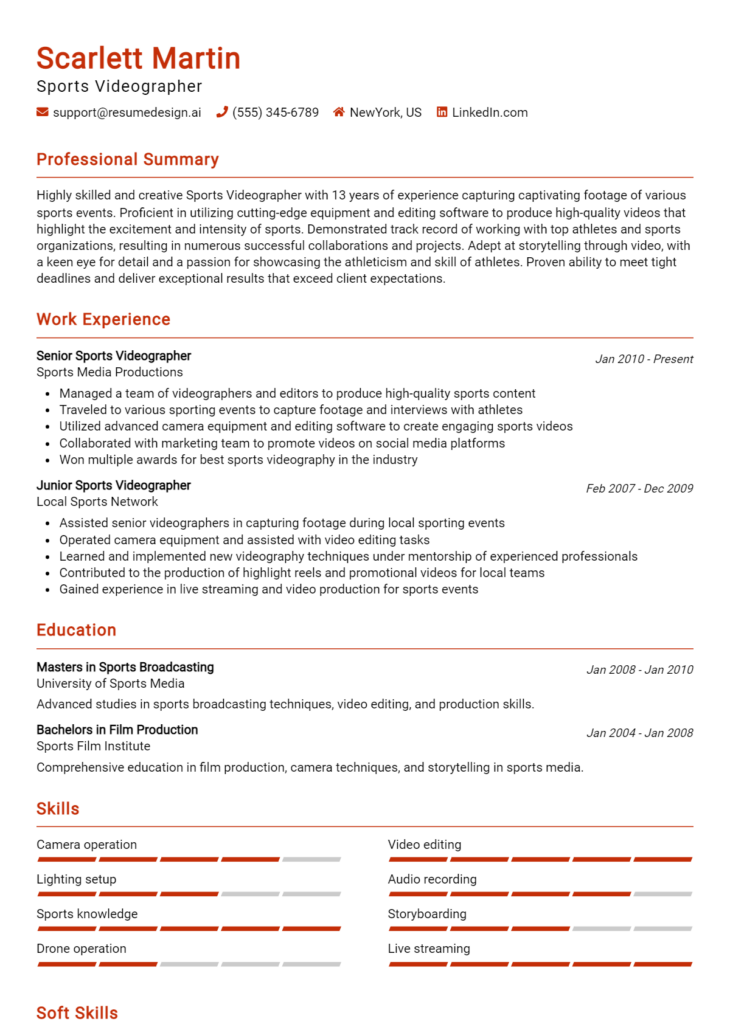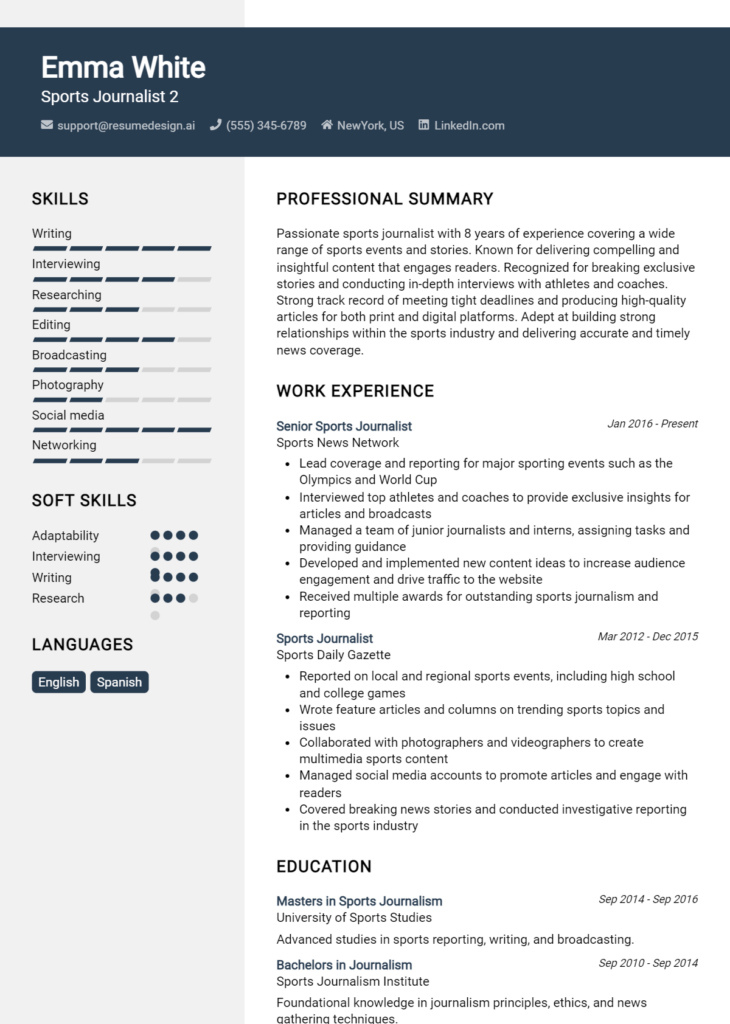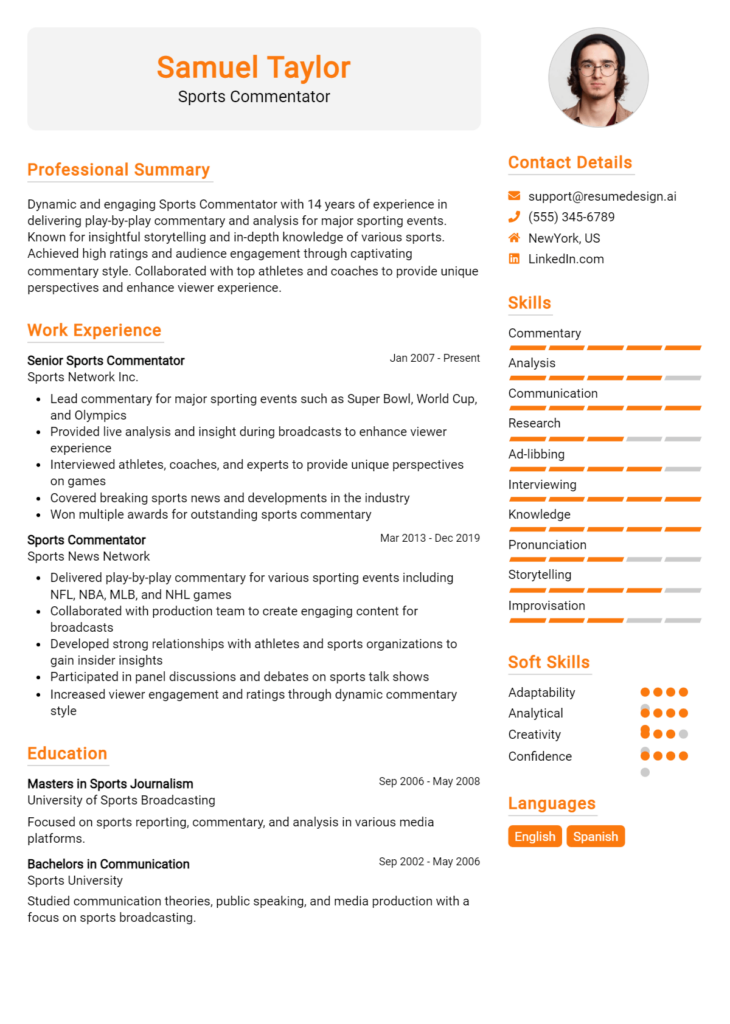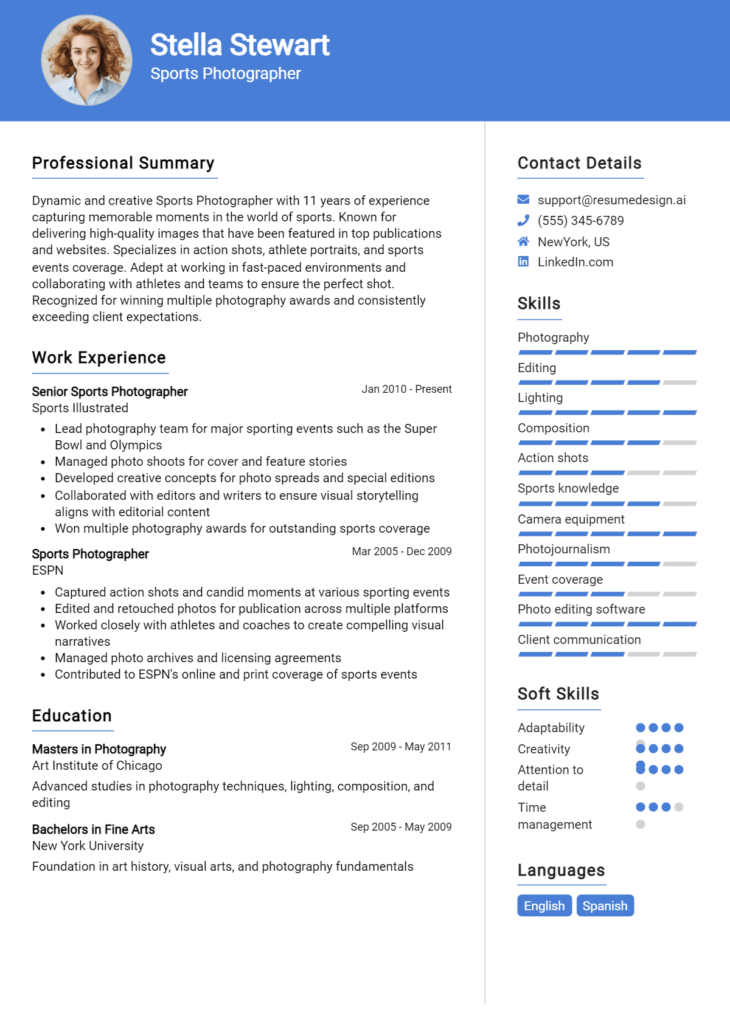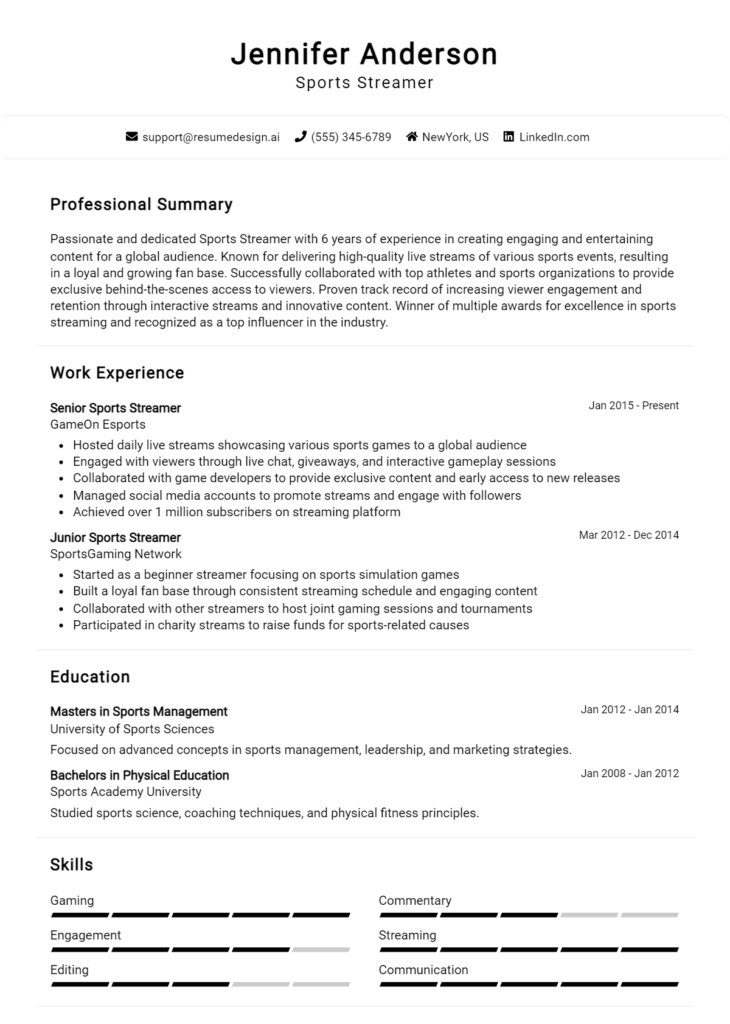Sports Broadcaster Core Responsibilities
A Sports Broadcaster plays a pivotal role in delivering live sports coverage and analysis, requiring a blend of technical, operational, and problem-solving skills. They must effectively communicate with production teams, journalists, and marketing departments to ensure seamless broadcasts. A strong understanding of sports, excellent verbal skills, and the ability to think on one's feet are crucial for success. A well-structured resume can highlight these competencies, showcasing how they contribute to the organization's goals by enhancing viewer engagement and brand visibility.
Common Responsibilities Listed on Sports Broadcaster Resume
- Deliver live commentary and analysis during sports events.
- Conduct interviews with athletes, coaches, and sports personnel.
- Research and prepare pre-game and post-game reports.
- Collaborate with production teams to plan and execute broadcasts.
- Write scripts and develop content for sports segments.
- Utilize technical equipment for audio and video production.
- Engage with audiences through social media platforms.
- Analyze game statistics and player performance for insights.
- Adapt quickly to changing situations during live broadcasts.
- Maintain knowledge of industry trends and sports news.
- Coordinate with marketing teams to promote broadcasts.
- Ensure compliance with broadcasting regulations and standards.
High-Level Resume Tips for Sports Broadcaster Professionals
In the competitive world of sports broadcasting, a well-crafted resume is essential for making a strong first impression on potential employers. Your resume serves as a powerful marketing tool that showcases your unique skills, experiences, and achievements in the industry. It not only needs to highlight your qualifications but also reflect your passion for sports and your ability to engage audiences. A polished resume can set you apart from other candidates and create a lasting impact on hiring managers. This guide will provide practical and actionable resume tips specifically tailored for Sports Broadcaster professionals, helping you to effectively communicate your value in this dynamic field.
Top Resume Tips for Sports Broadcaster Professionals
- Tailor your resume to the specific job description, incorporating relevant keywords and phrases.
- Showcase your on-air experience prominently, including any notable games or events you have covered.
- Quantify your achievements, such as audience ratings or viewership numbers, to demonstrate your impact.
- Highlight your proficiency with broadcasting equipment and software, emphasizing technical skills.
- Include any relevant certifications or training in journalism, broadcasting, or media production.
- Provide links to your demo reel or highlight clips to give employers a firsthand look at your broadcasting style.
- Detail your experience with social media and digital content creation, as these are increasingly important in the industry.
- Network within the industry and mention any professional associations or organizations you are part of.
- Keep your resume concise, ideally one page, focusing on the most relevant information that showcases your expertise.
- Use a clean and professional format that enhances readability and makes a positive visual impression.
By implementing these tips, you can significantly increase your chances of landing a job in the Sports Broadcaster field. A focused and well-structured resume will not only highlight your qualifications but also demonstrate your commitment to the profession, making you a standout candidate in a highly competitive industry.
Why Resume Headlines & Titles are Important for Sports Broadcaster
In the highly competitive field of sports broadcasting, having a standout resume is crucial for capturing the attention of hiring managers. A well-crafted resume headline or title serves as a powerful first impression, summarizing a candidate's key qualifications in a concise and impactful manner. This brief phrase not only highlights the applicant's relevant experience and skills but also sets the tone for the entire resume. By crafting a headline that is both relevant to the job being applied for and engaging, candidates increase their chances of being noticed in a sea of applicants.
Best Practices for Crafting Resume Headlines for Sports Broadcaster
- Keep it concise: Aim for a headline that is brief yet informative, ideally one to two lines.
- Be role-specific: Tailor the headline to reflect the specific position you are applying for.
- Highlight key skills: Incorporate your most relevant skills or experiences to grab attention.
- Use action words: Start with strong verbs to convey your accomplishments and expertise.
- Showcase unique strengths: Identify what sets you apart from other candidates and include it in the headline.
- Avoid jargon: Use clear, straightforward language that can be easily understood by hiring managers.
- Incorporate metrics: If possible, include quantifiable achievements to demonstrate your impact.
- Stay professional: Maintain a professional tone that aligns with the sports broadcasting industry.
Example Resume Headlines for Sports Broadcaster
Strong Resume Headlines
Dynamic Sports Broadcaster with 5+ Years of Live Event Coverage Experience
Award-Winning Sports Journalist Specializing in Interactive Digital Content
Versatile Sports Commentator with Proven Track Record in Audience Engagement
Experienced Sports Analyst Skilled in Data-Driven Reporting and Insights
Weak Resume Headlines
Just Another Sports Broadcaster
Looking for a Job in Broadcasting
Sports Enthusiast Seeking Opportunities
The strong headlines are effective because they provide specific information about the candidate's expertise and achievements, making them memorable and compelling. They are tailored to the role and highlight unique strengths, which can significantly impact a hiring manager's perception. In contrast, the weak headlines fail to impress due to their vague and generic nature, lacking the specificity and relevance that would draw attention in a competitive job market.
Writing an Exceptional Sports Broadcaster Resume Summary
A resume summary is a crucial element for any Sports Broadcaster looking to make a lasting impression on hiring managers. This brief yet impactful section serves as a snapshot of the candidate's key skills, experience, and accomplishments, enabling recruiters to quickly assess their suitability for the role. A well-crafted summary not only highlights relevant expertise but also reflects the broadcaster's unique voice and perspective, making it essential to tailor this section to the specific job at hand. By capturing attention with concise and powerful language, candidates can significantly enhance their chances of securing an interview in a competitive industry.
Best Practices for Writing a Sports Broadcaster Resume Summary
- Quantify achievements where possible to demonstrate impact, such as audience growth or ratings increases.
- Highlight specific broadcasting skills, including play-by-play commentary, sports analysis, or interviewing techniques.
- Tailor the summary to match the job description, using keywords that reflect the employer's needs.
- Be concise; aim for 2-4 sentences that effectively communicate your value.
- Showcase relevant experience in the sports industry, mentioning notable events or networks you’ve worked with.
- Incorporate your unique broadcasting style or personality to differentiate yourself from other candidates.
- Utilize action verbs to convey enthusiasm and proactivity in your career.
- Consider including awards or recognitions that validate your expertise in sports broadcasting.
Example Sports Broadcaster Resume Summaries
Strong Resume Summaries
Dynamic sports broadcaster with over 8 years of experience delivering engaging content for national networks, achieving a 30% increase in viewership during live events through compelling storytelling and expert analysis.
Acclaimed commentator known for in-depth sports knowledge and a unique on-air style, successfully led coverage of the 2023 World Series, resulting in a record-breaking audience of 5 million viewers.
Award-winning sports journalist with a track record of producing high-impact features and interviews, earning a regional Emmy for Best Sports Feature while increasing social media engagement by 50% across platforms.
Weak Resume Summaries
Experienced broadcaster looking for a new opportunity in sports. I have done various types of broadcasting and can work in different environments.
Passionate about sports and communication. I have been involved in sports broadcasting for a while and hope to find a job that suits my skills.
The strong resume summaries stand out because they provide specific details about achievements and skills, showcasing the candidate's capabilities and accomplishments in a quantifiable way. They also reflect a clear understanding of the sports broadcasting landscape and the candidate's significant impact within it. In contrast, the weak summaries are vague and lack measurable results, failing to convey the candidate's unique qualifications or enthusiasm for the role, making them less likely to attract the attention of hiring managers.
Work Experience Section for Sports Broadcaster Resume
The work experience section of a Sports Broadcaster resume is pivotal in demonstrating the candidate's technical skills, leadership abilities, and commitment to delivering high-quality broadcasts. This section not only highlights relevant roles and responsibilities but also provides concrete examples of achievements that align with industry standards. By quantifying accomplishments and showcasing expertise in managing teams and projects, candidates can effectively illustrate their value to potential employers, making it essential to craft this section with careful attention to detail and clarity.
Best Practices for Sports Broadcaster Work Experience
- Highlight technical skills related to broadcasting equipment, software, and production techniques.
- Quantify achievements with specific metrics, such as audience ratings or viewer engagement statistics.
- Emphasize collaboration by detailing experiences working with producers, directors, and other team members.
- Include relevant industry certifications and training to demonstrate ongoing professional development.
- Use action verbs to convey a sense of initiative and impact in each role.
- Tailor experiences to match the requirements of the job you are applying for, emphasizing relevant skills.
- Showcase adaptability by including experiences in various broadcasting formats, such as live events or pre-recorded shows.
- Incorporate feedback and recognition received from peers or superiors to highlight effectiveness in the role.
Example Work Experiences for Sports Broadcaster
Strong Experiences
- Produced and hosted live coverage of over 100 sporting events, achieving a 30% increase in viewership ratings during the last season.
- Led a team of 5 broadcasters in a regional sports network, resulting in award nominations for Best Live Coverage.
- Implemented new broadcasting software that reduced production time by 25%, enabling quicker turnaround for airing highlights.
- Collaborated with marketing teams to create promotional content that boosted social media engagement by 40%.
Weak Experiences
- Worked at a local station for a few months.
- Helped with some sports broadcasts.
- Participated in team meetings.
- Assisted in various production tasks.
The examples categorized as strong experiences highlight quantifiable outcomes, such as increased viewership and improved team performance, showcasing the candidate's technical leadership and collaborative efforts. Conversely, the weak experiences lack specificity and measurable achievements, providing little insight into the candidate's capabilities or contributions. Strong experiences effectively illustrate the impact of the candidate's work, while weak experiences fail to convey the necessary details that would attract potential employers.
Education and Certifications Section for Sports Broadcaster Resume
The education and certifications section of a Sports Broadcaster resume plays a crucial role in establishing the candidate's credibility and expertise in the field. This section not only showcases the academic background that underpins their knowledge of sports and broadcasting but also highlights any industry-relevant certifications and specialized training that demonstrate their commitment to professional development. By providing relevant coursework, certifications, and continuous learning efforts, candidates can effectively align themselves with the expectations of employers and set themselves apart in a competitive job market.
Best Practices for Sports Broadcaster Education and Certifications
- Prioritize relevant degrees such as Journalism, Communications, or Sports Management.
- Include industry-recognized certifications, like those from the National Association of Broadcasters (NAB) or the Sportscasters Association.
- Highlight specialized training, workshops, or internships related to broadcasting or sports commentary.
- Detail relevant coursework that demonstrates a strong foundation in media, production, or sports analysis.
- Keep the section concise and focused on qualifications that directly relate to sports broadcasting.
- Use clear formatting to ensure that the information is easy to read and understand.
- Update the section regularly to reflect any new certifications or educational achievements.
- Consider including honors or awards received during education that may enhance credibility.
Example Education and Certifications for Sports Broadcaster
Strong Examples
- Bachelor of Arts in Sports Journalism, University of Sports Media, 2022
- Certification in Broadcast Journalism, National Association of Broadcasters (NAB), 2023
- Completed coursework in Sports Commentary and Media Ethics, University of Sports Media
- Internship at XYZ Sports Network, focusing on live sports coverage and reporting, Summer 2022
Weak Examples
- Associate Degree in General Studies, Community College, 2020
- Certification in Basic Computer Skills, Online Course, 2021
- Bachelor of Arts in History, University of History, 2019
- Old certification in Print Journalism from 2010, no longer relevant to broadcasting
The examples provided illustrate the importance of relevance and specificity in the education and certifications section. Strong examples feature degrees and certifications that are directly aligned with sports broadcasting, showcasing the candidate's qualifications and readiness for the role. In contrast, weak examples highlight degrees and certifications that lack direct relevance to the field, which can detract from the candidate's overall appeal to potential employers. By carefully curating this section, candidates can effectively position themselves as qualified and knowledgeable professionals in the sports broadcasting industry.
Top Skills & Keywords for Sports Broadcaster Resume
As a Sports Broadcaster, possessing the right skills is paramount to success in a fiercely competitive industry. A well-crafted resume that highlights both hard and soft skills can significantly increase your chances of landing a coveted position in sports media. Employers look for candidates who not only have the technical know-how but also the interpersonal abilities to connect with audiences and convey the excitement of the game. By showcasing a balanced mix of skills on your resume, you demonstrate your readiness to engage with fans, collaborate with teams, and adapt to the dynamic nature of sports broadcasting.
Top Hard & Soft Skills for Sports Broadcaster
Soft Skills
- Excellent verbal communication
- Strong storytelling ability
- Adaptability to fast-paced environments
- Team collaboration
- Critical thinking
- Time management
- Active listening
- Interpersonal skills
- Creativity
- Passion for sports
Hard Skills
- Proficiency in broadcasting software
- Knowledge of sports statistics and analytics
- Video editing skills
- Familiarity with camera equipment
- Scriptwriting and teleprompter proficiency
- Social media management
- Live reporting techniques
- Research and preparation for broadcasts
- Understanding of FCC regulations
- Audio editing and mixing skills
By emphasizing these essential hard and soft skills on your resume, you can effectively communicate your qualifications and experiences, thereby enhancing your work experience in the sports broadcasting field.
Stand Out with a Winning Sports Broadcaster Cover Letter
Dear [Hiring Manager's Name],
I am excited to express my interest in the Sports Broadcaster position at [Company Name] as advertised [where you found the job listing]. With a background in sports journalism and a passion for delivering compelling narratives, I am confident in my ability to contribute to your team and engage your audience through dynamic storytelling and insightful analysis. My experience covering a wide range of sporting events, from local high school games to professional championships, has equipped me with the skills necessary to thrive in the fast-paced world of sports broadcasting.
During my time at [Previous Company/Institution], I honed my abilities in live commentary, interview techniques, and sports reporting. I successfully hosted a weekly sports segment that not only increased viewer engagement by 30% but also garnered positive feedback from both fans and stakeholders. My strong communication skills, combined with a deep understanding of various sports, enable me to connect with audiences and provide them with the context and commentary they crave. Additionally, my proficiency in using broadcasting equipment and editing software has allowed me to produce high-quality content that resonates with viewers.
I am particularly drawn to [Company Name] because of its commitment to delivering exceptional sports coverage and its innovative approach to engaging audiences across multiple platforms. I am eager to bring my enthusiasm for sports, my creative storytelling techniques, and my dedication to journalistic integrity to your team. I am excited about the opportunity to collaborate with other talented professionals and contribute to the exciting content that [Company Name] is known for.
Thank you for considering my application. I look forward to the opportunity to discuss how my background, skills, and passion for sports broadcasting align with the goals of [Company Name]. I am enthusiastic about the possibility of being a part of your team and contributing to the incredible work you do.
Sincerely,
[Your Name]
[Your Contact Information]
[LinkedIn Profile or Portfolio, if applicable]
Common Mistakes to Avoid in a Sports Broadcaster Resume
When applying for a position as a sports broadcaster, it's essential to present a polished and professional resume that highlights your skills and experience in the field. However, many candidates make common mistakes that can undermine their chances of landing an interview. By avoiding these pitfalls, you can create a compelling resume that effectively showcases your qualifications.
Lack of Relevant Experience: Failing to highlight experience specific to sports broadcasting can make your resume less appealing. Make sure to include internships, freelance work, or volunteer positions that demonstrate your broadcasting skills.
Ignoring the Target Audience: Not tailoring your resume to the specific job or organization can lead to missed opportunities. Research the company and customize your resume to align with their values and expectations.
Overly Complex Language: Using jargon or complex terminology can alienate hiring managers. Keep your language clear and straightforward to ensure your qualifications are easily understood.
Neglecting to Include Metrics: Omitting quantifiable achievements can weaken your resume. Include metrics such as audience growth, ratings, or social media engagement to illustrate your impact.
Poor Formatting: A cluttered or unprofessional layout can detract from your content. Use a clean, organized format with clear headings and bullet points for easy readability.
Weak Summary Statement: A vague or generic summary at the top of your resume may fail to grab attention. Craft a strong, specific summary that highlights your unique strengths and career goals.
Ignoring Relevant Skills: Not showcasing key skills relevant to broadcasting, such as communication, analytical thinking, or multimedia proficiency, can limit your appeal. Be sure to include a dedicated skills section.
Spelling and Grammar Errors: Simple mistakes can create a negative impression. Carefully proofread your resume to eliminate any typos or grammatical errors before submitting it.
Conclusion
As we wrap up our discussion on the vital role of a Sports Broadcaster, it's clear that this profession demands a unique blend of skills, including exceptional communication, in-depth sports knowledge, and the ability to engage with audiences across various platforms. Broadcasters must stay updated on sports trends, hone their storytelling abilities, and maintain a strong on-air presence to captivate their viewers.
To stand out in this competitive field, it's essential to have a polished resume that highlights your relevant experience and skills. Take a moment to review your Sports Broadcaster resume and ensure it reflects your passion and expertise in sports journalism.
To help you craft an impressive resume, consider utilizing the following tools:
- Resume Templates: Choose from a variety of professional designs to make your resume visually appealing.
- Resume Builder: Create and customize your resume quickly with user-friendly features.
- Resume Examples: Gain inspiration from successful resumes in the broadcasting field.
- Cover Letter Templates: Complement your resume with a strong cover letter that showcases your enthusiasm for the position.
Don’t miss the chance to enhance your career prospects in sports broadcasting. Start reviewing and updating your resume today!

